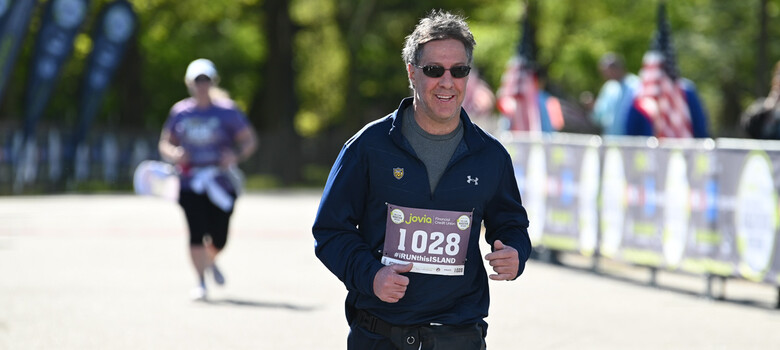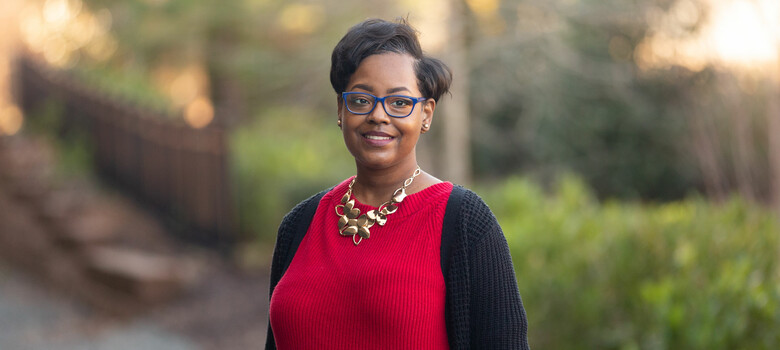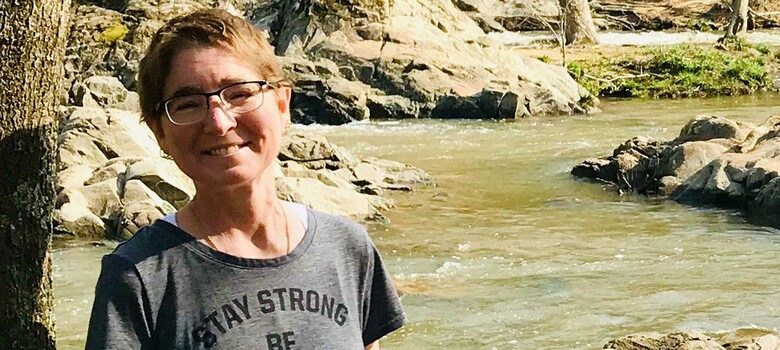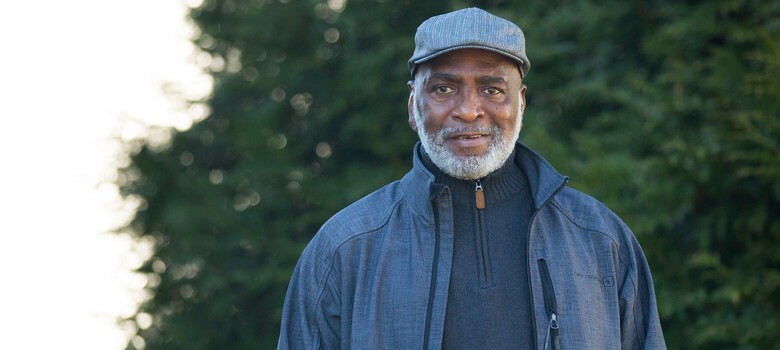‘Third Time’s the Charm’ for Indianapolis Woman After Third Lung Transplant at Duke
Duke Performs More Third Lung Transplants Than any U.S. Center
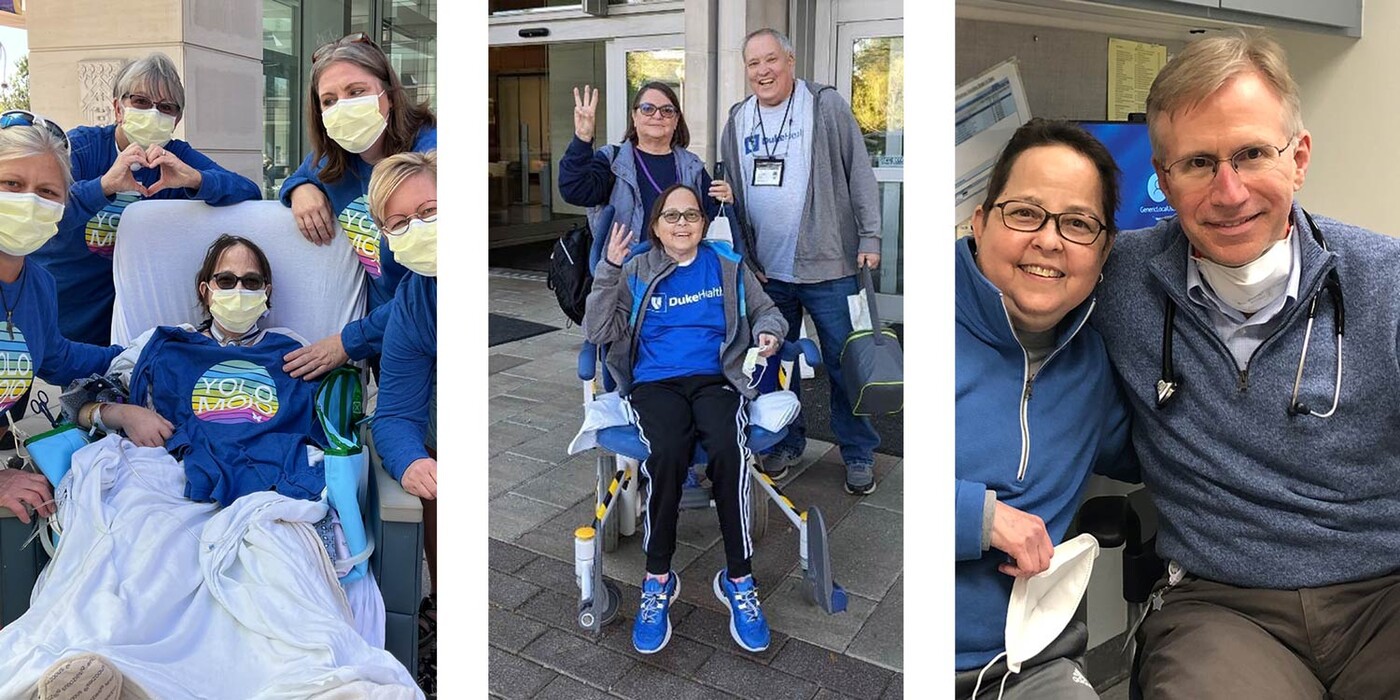
From left: Jen Weber celebrates her third lung transplant with her friends; Weber leaves the hospital with her family members, Weber with Dr. John Reynolds after her transplant.
Only 23 people have undergone three double lung transplants in the U.S. as of February 2024. Thirteen of those were performed at Duke Health. Jennifer Weber of Indianapolis is one of them.
For most of her life, Weber has lived with cystic fibrosis, a condition that damaged her lungs and other organs. Her first and second transplants were performed in Indiana. After she experienced signs of rejection for the third time, her doctors told her to go to Duke where doctors have performed more than half of the third lung transplants in the U.S. After a year-long recovery, Weber, 50, is back to playing cello in the symphony and just signed up for a mini-marathon.
First and Second Lung Transplants
Weber was 36 when her lungs started to fail the first time. She had a lung transplant in 2010, returned to work as an attorney, and ran in a few mini-marathons. “I was living my best life,” she said. After two years, she felt short of breath, got a chronic cough, and became dependent on oxygen -- all signs of rejection. Within days she was on a ventilator in intensive care. Weber underwent her second lung transplant in Indiana in 2012.
Weber bounced back after the second transplant but signs of rejection started again in 2015. She controlled them with medication, returned to work, and played the cello in a regional symphony. She participated in the Transplant Games of America and won a gold medal in golf. By 2022, she needed a third transplant. She was 48.
“I was substantially older than a lot of patients getting third transplants,” said Weber. Her doctors in Indianapolis told her to contact Duke’s lung transplant program as it was one of the few medical centers in the country performing third transplants. Fortunately, one of her pulmonologists in Indiana, John Reynolds, MD, was now at Duke. “I trusted him and Duke’s reputation,” she said.
Decades of Experience Behind Duke’s Lung Transplant Success
Each time a person undergoes a lung transplant, the odds of having complications increase, explained Dr. Reynolds. That’s why many centers won’t perform retransplants. “Some feel they don’t have the expertise as each is more complex.” Scarring can build in the chest after surgery, there are increased risks of bleeding and infection, and toxicities from anti-rejection medications can affect the kidneys and other body systems. Sometimes patients are turned down by other centers because of their age.
Years ago, the Duke team focused their efforts on preparing people for successful third lung transplants. “If something with a limited resource has failed twice, you hope you can do something different to make it successful,” Dr. Reynolds said. The team evaluates everything, such as how to refine their approach before and after the procedure and ways to minimize injury to the lungs to achieve the best outcomes. Most of Duke’s 13, third lung transplant patients are doing well. Their success, Dr. Reynolds said, is “a credit to them and the collective effort of the team.”
The team uses the same careful consideration to manage patients having first and second transplants, he said. “We try to help patients who face a barrier to transplant. Some need a retransplant, others have a condition that other centers don’t have the skill set or expertise to manage.” It may be an infection, cardiac issue, or the person’s age. “Our program has built a lot of expertise over the decades to manage these complex patients,” he said.
Relocating to Durham to Wait Prepare for Lung Transplant
After a five-day lung and body evaluation in June 2022, Weber moved to Durham and started pulmonary rehabilitation. While her lungs grew weaker, her body got stronger.
In January 2023, doctors procured the lungs for her transplant. Weber went through every known complication after surgery. She spent months in the ICU, was on dialysis, endured infections, and had to live with a tracheotomy. “I was so weak that I couldn’t stand up. I couldn’t put my glasses on my face,” she said. Once she was strong enough, she started pulmonary rehabilitation again. She returned to Indianapolis nearly a year after her surgery.
Weber Is Grateful and Doing Great
“I’ve recovered from three lung transplant surgeries, but the toll takes something out of you,” Weber said. “On the flip side, Duke knows that and prepares you with pre- and post-rehab. Now I’m doing great. My lung function is strong and stable and keeps improving.”
Weber is back to playing the cello in the symphony. “I’m able to focus on the music and not breathing. I signed up for a mini-marathon. I can talk and I’m not breathless. I’m grateful to my doctors in Indiana who sent me to Duke, and I’m grateful that Duke took a chance on me.”
Success Comes from Grit and Determination
According to Dr. Reynolds, Weber’s success is a testament to her grit and determination. Most people who have undergone three lung transplants are successful because they are survivors. “They’ve lived with a chronic illness their whole life,” Dr. Reynolds said. “A significant part of their success with the rigors of a third transplant is that they are tough. They have what it takes to get them through the demands and challenges."
